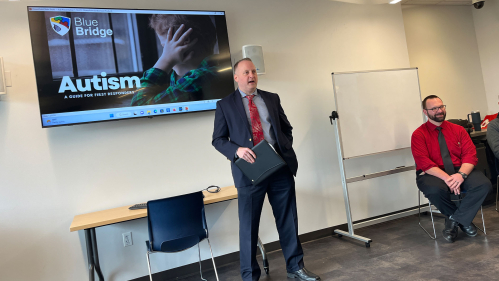Rutgers Autism Center and University Police Partner to Build Understanding of Neurodiversity

Rutgers Police, students and staff gathered for immersive training and town hall discussion
Being stopped by a police officer can be anxiety-provoking for anyone and even more traumatic for someone on the autism spectrum.
A growing awareness of the conflict that can happen between police and individuals on the autism spectrum led Kenneth Cop, executive director of public safety and chief of the Rutgers University Police Department (RUPD) to join the Rutgers Neurodiversity Task Force. Chaired by Christopher Manente, executive director of the Rutgers Center for Adult Autism Services (RCCAS), the task force – comprised of a group of thought leaders, faculty and students – aims to identify the needs and priorities of the university’s neurodivergent community in order to create a more inclusive campus environment.
“Protecting the Rutgers community includes learning from people when they are not in crisis in order to establish more positive interactions,” said Cop, who recently watched a video of law enforcement interacting with an autistic teenager as part of a training.
“He was stimming [a repetitive motion or vocalization], avoiding eye contact and twirling an unfamiliar object, but the officer interpreted it as suspicious and threatening,” Cop said. “The exchange did not go well for either party.”
As a result of his involvement with the task force – and knowing that several Rutgers officers have family members on the autism spectrum – Cop has worked to share the lessons he’ learned about neurodiversity with Rutgers police.
Research has shown that building rapport between police officers and neurodiverse community members can be challenging. According to Autism Speaks, a 2019 study of autistic adults found that 53 percent of participants had four or more interactions with the police in their lifetime and that many respondents' negative experiences were caused by an officer's lack of understanding of autism spectrum disorder (ASD). Behavioral traits of the neurodiverse population often get mistaken for intoxication, criminal behavior or even mental illness.
To address this issue on campus, Manente and Cop worked together to bring a first-of-its-kind training to Rutgers. “We are grateful for the opportunity to train the Rutgers community about the neurodiverse student population and excited to have formed this collaborative partnership with RUPD, proving that clearly, we are, ‘better together,’” said Arpana Inman, dean of the Rutgers Graduate School of Applied and Professional Psychology, where the RCAAS is based.
Recently, a group of 60 people – including neurodiverse students and their peer mentors, staff members and police officers – attended a meet-and-greet session, immersive training and town hall discussion.
“There are few hands-on training opportunities for police and first responders, which is unfortunate given the state’s high prevalence of autism. Trainings that do exist are limited, lectured-based or online modules that typically focus on hypotheticals,” said Manente, adding, “Involving autistic people in the training is critical to ensuring that both parties are better prepared to navigate these situations and improve everyone’s safety.”
Held at the RCAAS Community Center, the event created an opportunity for RUPD officers and students with autism to interact. The students were from the College Support Program, an RCAAS unit that supports adults on the autism spectrum as they begin, continue and prepare to graduate from Rutgers-New Brunswick.
According to Captain Matthew Gulsby, who has 30 years of law enforcement experience, the training is all about understanding. “To be able to hear directly from the students was beneficial for veteran cops and those just out of the academy,” he said. “We often need to make split-second decisions. The more information the students share with us about themselves, their challenges and the reason behind their behaviors, the more likely we are to handle an interaction differently.”
The training was led by Gerald Turning Jr., a retired police captain and father of a young adult with autism and founder of Blue Bridge, whose mission is to “build a bridge” among police, first responders and the autism community.
“This is extraordinary, these two communities coming together,” said Turning. “I want the students to know that cops are required to establish control once they are on a scene, it’s not personal, and I highly encourage students to inform officers up front about their sensory, processing, and/or communication challenges. It allows those with ASD to be an advocate for themselves.”
Manente said Rutgers hopes to work towards helping other law enforcement by developing a training model that can be shared outside the university. “We hope to expand it and develop a formal curriculum to benefit New Jerseyans, and one that can engage other police departments and first responder agencies nationally,” he said.
Students who attended the training also recognized the benefit.
“After today, I see the police officers more as friends who are meant to help,’’ said Jake Schaefer, a sophomore in the School of Arts and Sciences. ‘’My favorite part was the opportunity to openly speak and share.”


